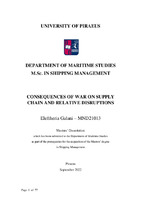Consequences of war on supply chain and relative disruptions

Master Thesis
Συγγραφέας
Γαλάνη, Ελευθερία
Galani, Eleftheria
Ημερομηνία
2022-09Επιβλέπων
Παπαδημητρίου, ΕυστράτιοςΠροβολή/
Λέξεις κλειδιά
Ναυτιλία ; Πόλεμος ; Εφοδιαστική αλυσίδα ; ΣυνέπειεςΠερίληψη
Για τον ουκρανικό λαό, ο πόλεμος είναι μια ανθρωπιστική τραγωδία, αλλά έχει επίσης σημαντικό οικονομικό αντίκτυπο στον κόσμο. Οι άμεσες επιπτώσεις του πολέμου στο διεθνές εμπόριο και τις επενδύσεις είναι το κύριο θέμα αυτού του δοκιμίου. Τα κύρια ζητήματα που τέθηκαν σε αυτή τη μελέτη είναι πώς θα επηρεαστεί το εμπόριο και η ευημερία, ιδιαίτερα στις αναπτυσσόμενες χώρες, στο εγγύς μέλλον. Ποιοι κλάδοι αντιμετωπίζουν τη μεγαλύτερη αναστάτωση;
Ο πόλεμος έρχεται σε μια κρίσιμη καμπή στην παγκόσμια οικονομία. Επειδή τα ξεσπάσματα του COVID-19 εξακολουθούν να συμβαίνουν και υπάρχει λιγότερη πολιτική υποστήριξη, η ανάκαμψη από την ύφεση που προκαλείται από την πανδημία είναι αργή. Πολλά έθνη αντιμετωπίζουν αυξανόμενο πληθωρισμό, επομένως οι μεγάλες οικονομίες αυξάνουν τα επιτόκια για να προσπαθήσουν να τον σταματήσουν. Η ανάπτυξη στις αναπτυσσόμενες χώρες θα περιοριστεί από διαταραχές στο διεθνές εμπόριο και τις επενδύσεις, και ως αποτέλεσμα θα αυξηθούν οι πιέσεις στις τιμές, ιδιαίτερα εάν οι κυβερνήσεις επιβάλουν εμπορικούς περιορισμούς για να προστατεύσουν τις οικονομίες τους.
Ο άμεσος αντίκτυπος του πολέμου γίνεται αισθητός στο εμπόριο τροφίμων και ενέργειας. Όσον αφορά την παραγωγή και εξαγωγή σιταριού, καλαμποκιού, κριθαριού, ηλιόσπορων και ηλιελαίου, η Ρωσία και η Ουκρανία συγκαταλέγονται στις επτά κορυφαίες χώρες στον κόσμο. Μαζί με τα λιπάσματα και τα γεωργικά προϊόντα, η Ρωσία είναι σημαντικός προμηθευτής ορυκτών καυσίμων όπως το αργό πετρέλαιο και το φυσικό αέριο. Οι τιμές αυξάνονται ως αποτέλεσμα των διακοπών σε αυτές τις προμήθειες, οι οποίες έχουν αρνητικές επιπτώσεις στο παγκόσμιο εμπόριο, την ευημερία και ασύμμετρες επιπτώσεις στα έθνη εξαγωγείς και εισαγωγείς. Οι υψηλότερες τιμές των εμπορευμάτων, η αύξηση της παραγωγής και οι αυξημένες αποστολές βοηθούν τους εξαγωγείς να αντισταθμίσουν μέρος της μείωσης των εξαγωγών από τη Ρωσία και την Ουκρανία.


